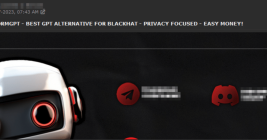Meet the Brains Behind the Malware-Friendly AI Chat Service ‘WormGPT’
WormGPT, a private new chatbot service advertised as a way to use Artificial Intelligence (AI) to help write malicious software without all the pesky prohibitions on such activity enforced by ChatGPT and Google Bard, has started adding restrictions on how the service can be used. Faced with customers trying to use WormGPT to create ransomware and phishing scams, the 23-year-old Portuguese programmer who created the project now says his service is slowly morphing into “a more controlled environment.”
The large language models (LLMs) made by ChatGPT parent OpenAI or Google or Microsoft all have various safety measures designed to prevent people from abusing them for nefarious purposes — such as creating malware or hate speech. In contrast, WormGPT has promoted itself as a new LLM that was created specifically for cybercrime activities.





